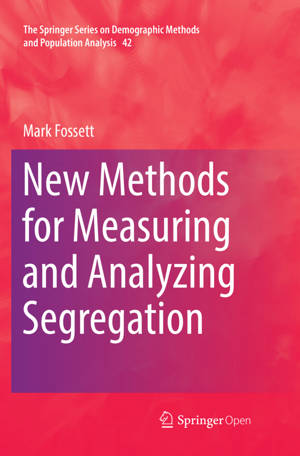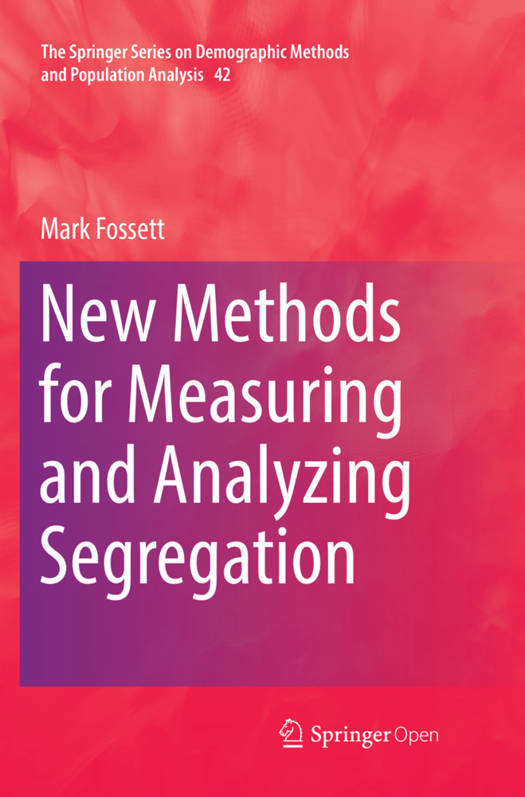
- Afhalen na 1 uur in een winkel met voorraad
- Gratis thuislevering in België vanaf € 30
- Ruim aanbod met 7 miljoen producten
- Afhalen na 1 uur in een winkel met voorraad
- Gratis thuislevering in België vanaf € 30
- Ruim aanbod met 7 miljoen producten
Zoeken
Omschrijving
This book is open access under a CC BY-NC 2.5 license.
This book introduces new methods for measuring and analyzing residential segregation. It begins by placing all popular segregation indices in the "difference of group means" framework wherein index scores can be obtained as simple differences of group means on individual-level residential attainments scored from area racial composition. Drawing on the insight that in this framework index scores are additively determined by individual residential attainments, the book shows that the level of segregation in a given city can be equated to the effect of group membership (e.g., race) on individual residential attainments. This unifies separate research traditions in the field by joining the analysis of segregation at the aggregate level with the analysis of residential attainments for individuals. Next it shows how segregation analysis can be extended by using multivariate attainment models to assess the impact of group membership (i.e., the level of segregation for a city) while including controls for other relevant individual characteristics (e.g., income, education, language, nativity, etc.). It then illustrates how one can use these models to quantitatively assess the extent to which segregation traces to impacts of group membership on residential attainments versus other factors such as group differences in income. The book then shows how micro-level attainment models can be used to study macro-level variation in segregation; specifically, by estimating multi-level models of individual residential attainments to assess how the effect of group membership (i.e., segregation index scores) vary with city characteristics. Finally, the book introduces refined versions of popular indices that are free of the vexing problem of upward bias. This improves the quality of segregation measurement directly at the level of individual cases and expanding the number of cases that can be safely included in empirical studies.
This book introduces new methods for measuring and analyzing residential segregation. It begins by placing all popular segregation indices in the "difference of group means" framework wherein index scores can be obtained as simple differences of group means on individual-level residential attainments scored from area racial composition. Drawing on the insight that in this framework index scores are additively determined by individual residential attainments, the book shows that the level of segregation in a given city can be equated to the effect of group membership (e.g., race) on individual residential attainments. This unifies separate research traditions in the field by joining the analysis of segregation at the aggregate level with the analysis of residential attainments for individuals. Next it shows how segregation analysis can be extended by using multivariate attainment models to assess the impact of group membership (i.e., the level of segregation for a city) while including controls for other relevant individual characteristics (e.g., income, education, language, nativity, etc.). It then illustrates how one can use these models to quantitatively assess the extent to which segregation traces to impacts of group membership on residential attainments versus other factors such as group differences in income. The book then shows how micro-level attainment models can be used to study macro-level variation in segregation; specifically, by estimating multi-level models of individual residential attainments to assess how the effect of group membership (i.e., segregation index scores) vary with city characteristics. Finally, the book introduces refined versions of popular indices that are free of the vexing problem of upward bias. This improves the quality of segregation measurement directly at the level of individual cases and expanding the number of cases that can be safely included in empirical studies.
Specificaties
Betrokkenen
- Auteur(s):
- Uitgeverij:
Inhoud
- Aantal bladzijden:
- 334
- Taal:
- Engels
- Reeks:
- Reeksnummer:
- nr. 42
Eigenschappen
- Productcode (EAN):
- 9783319823188
- Verschijningsdatum:
- 22/06/2018
- Uitvoering:
- Paperback
- Formaat:
- Trade paperback (VS)
- Afmetingen:
- 156 mm x 234 mm
- Gewicht:
- 508 g

Alleen bij Standaard Boekhandel
+ 105 punten op je klantenkaart van Standaard Boekhandel
Beoordelingen
We publiceren alleen reviews die voldoen aan de voorwaarden voor reviews. Bekijk onze voorwaarden voor reviews.











